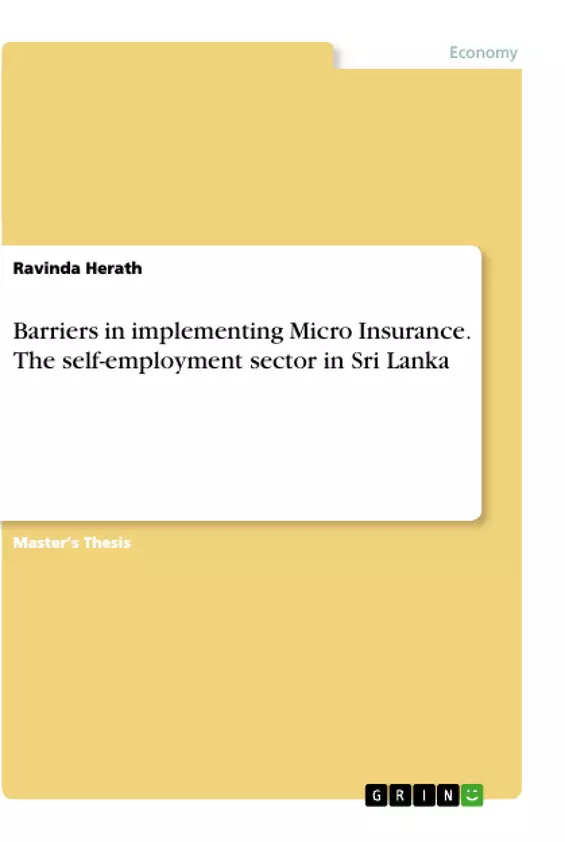The key objective of this study is to identify the main obstacles or variables those effect on implementation of micro insurance programs, with special attention to the self-employment sector in Sri Lanka. As we can see a large number of self-employees join with the community based organizations in rural areas. Therefore this study was carried out via SANASA cooperative societies based in rural communities in 16 districts all over the island. The network of SANASA cooperative societies is the largest cooperative network in rural areas representing more than 17 % of Sri Lankan population inclusive of their family members. Simple Random sampling technique was used to identify the participants (respondents) for this study and the total number of respondents of the sample was 300; nevertheless data was collected only from 278 participants. Selected members were given with the questionnaire and a discussion took place to fill the questionnaires.
There are many factors as the barriers for implementing micro insurance programs. All these factors have a great impact on successful implementation of micro insurance programs for lower income groups. Among these causes, willingness to pay/buy insurance, affordability, accessibility and consumer trust on insurance were selected as the key variables to carry out this study. Accordingly, an integration of these variables has been used to develop the conceptual framework which provides the guideline to develop the hypothesis for this study. In order to measure the strength of relationship among variables, eight hypotheses were made in par with “implementation of micro insurance” as the dependent variable and four independent variables those mentioned above. The effectiveness of implementation of micro insurance programs can or cannot be influenced by independent variables.
Inhaltsverzeichnis (Table of Contents)
- Chapter 01: Introduction of the study
- Introduction
- 1.1 Background of the study
- 1.2 Problem statement
- 1.3 Problem justification
- 1.4 Objectives of the Study
- 1.5 Significance of the study
- 1.6 Scope of the study
- Chapter 02: Literature review
- 2.1 Introduction
- 2.2 Willingness to pay/buy for insurance
- 2.3 Poor accessibility for insurance by rural communities
- 2.4 Affordability
- 2.5 Consumer trust/ confidence on micro insurance
- 2.6 Conclusion
- Chapter 03: Research Methodology
- 3.1 Introduction
- 3.2 Conceptual Framework
- 3.3 Research Hypotheses
- 3.4 Population
- 3.5 Sample
- 3.6 Data Collection
- 3.7 Statistical methodology
- Chapter 04:Data Presentation and Analysis
- 4.1 Profile of Respondents
- 4.2 Findings
- 4.2.1. Analysis of Independent variable 01 - Willingness to pay/buy for insurance
- 4.2.2. Analysis of Independent variable 02 – Accessibility for insurance by rural community
- 4.2.3. Analysis of Independent variable 03 – Affordability
- 4.2.4. Analysis of Independent variable 04 Consumer trust/Confidence in micro insurance
- Chapter 05:Discussions of Findings and Interpretation
- 5.1 Interpretation and discussion of hypothesis
- 5.2. Variable 01 - Willingness to pay/buy for insurance
- 5.3 Variable 02 - Accessibility for insurance by rural communities
- 5.4 Variable 03 - Affordability
- 5.5 Variable 04 - Consumer trust/ confidence in micro insurance
Zielsetzung und Themenschwerpunkte (Objectives and Key Themes)
This study aims to identify the key obstacles or variables that impact the implementation of micro insurance programs, specifically within the self-employment sector of Sri Lanka. The study uses data from SANASA cooperative societies based in rural areas to explore how these barriers affect the success of micro insurance programs for lower-income groups.
- Barriers to micro insurance implementation
- Impact of micro insurance programs on lower-income groups
- Analysis of key variables affecting program success
- The role of consumer trust and confidence in micro insurance
- Accessibility and affordability of micro insurance programs in rural communities
Zusammenfassung der Kapitel (Chapter Summaries)
- Chapter 1: Introduction of the study provides an overview of the research topic, including the background, problem statement, justification, objectives, significance, and scope of the study.
- Chapter 2: Literature review examines existing research on the factors that affect the implementation of micro insurance programs, focusing on areas like willingness to pay, affordability, accessibility, and consumer trust.
- Chapter 3: Research Methodology details the conceptual framework, research hypotheses, population, sample selection, data collection methods, and statistical analysis techniques employed in the study.
- Chapter 4: Data Presentation and Analysis presents the findings of the study, including the profile of respondents and an analysis of the key independent variables.
- Chapter 5: Discussions of Findings and Interpretation provides a detailed interpretation and discussion of the research hypotheses, drawing on the analysis of the key variables.
Schlüsselwörter (Keywords)
The primary keywords and focus topics of this study include: micro insurance, self-employment, rural communities, Sri Lanka, accessibility, affordability, consumer trust, implementation barriers, willingness to pay, SANASA cooperative societies, lower-income groups, research methodology, data analysis.
Frequently Asked Questions
What are the main barriers to implementing micro insurance in Sri Lanka?
Key obstacles identified include the willingness to pay, affordability of premiums, poor accessibility for rural communities, and a lack of consumer trust in insurance providers.
Who is the target group of this micro insurance study?
The study focuses on the self-employment sector and lower-income groups in rural areas of Sri Lanka, specifically members of SANASA cooperative societies.
What is the role of SANASA cooperative societies?
SANASA is the largest cooperative network in rural Sri Lanka, representing over 17% of the population. It serves as the primary platform for delivering micro insurance to the self-employed.
How does consumer trust affect micro insurance implementation?
Consumer trust is a critical independent variable; without confidence in the insurer's ability to pay claims, lower-income groups are unlikely to participate in micro insurance programs.
What methodology was used to gather data for this research?
The researcher used a simple random sampling technique with 278 respondents across 16 districts, combining questionnaires with face-to-face discussions.
- Quote paper
- Ravinda Herath (Author), 2016, Barriers in implementing Micro Insurance. The self-employment sector in Sri Lanka, Munich, GRIN Verlag, https://www.grin.com/document/504105



